Japan-North Korea Relations
Steps Taken in Japan
1. Establishment of the "Headquarters for the Abduction Issue"
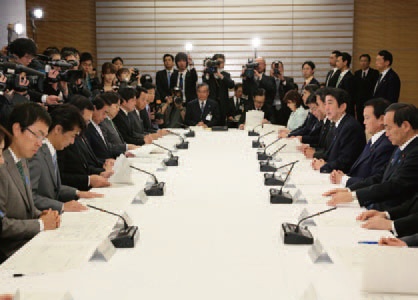
The first meeting of the Headquarters for the Abduction Issue (January 2013)
In January 2013, the GoJ established a new "Headquarters for the Abduction Issue" consisting of all Ministers of State, in order to discuss measures to address the abductions issue and to promote strategic approaches and comprehensive measures for the resolution of this issue. The Headquarters is led by the Prime Minister serving as the head and the Minister of State for the Abduction Issue, the Chief Cabinet Secretary, and the Foreign Minister serve as the deputies. Individual Ministers closely collaborate with mainly the head and deputies and exert themselves to the utmost of their ability in their respective fields of responsibility towards the goal of resolving the abductions issue.
Moreover, the "Liaison Council of Government and Ruling and Opposition Parties Institutions for Measures against Abduction Issue" has been formed to strengthen bipartisan efforts towards the resolution of the abductions issue.
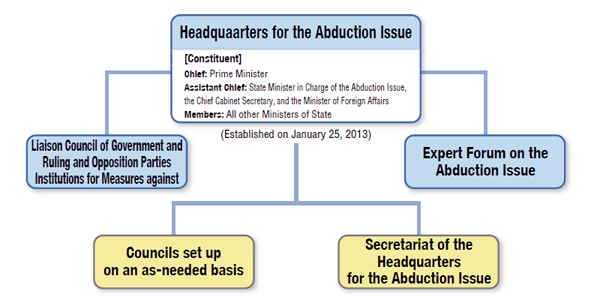
Policies and Concrete Measures for Resolving the Abduction Issue
1. Policies
The abduction of Japanese citizens by North Korea is a grave concern which affects the national sovereignty of Japan and the lives and safety of the Japanese people, and urgently needs to be resolved by the government. The government will firmly maintain its basic policy that the normalization of diplomatic relations with North Korea will not occur until the abduction issue is resolved, and will endeavor to have their safety secured and bring them back to Japan immediately, irrespective of whether they are officially identified as abductees. The government is committed to continuing its investigation of the truth and demanding the handover of those responsible for the abductions.
2. Concrete measures
With the initiative of the chief and the assistant chiefs of the Headquarters, all Cabinet ministers should cooperate in implementing the above-mentioned policy, and should make their utmost efforts in the following eight points within their respective areas of responsibility.
- (1) to discuss further countermeasures and promote strict law enforcement under the current legal framework to urge North Korea to speedily resolve the abduction issue;
- (2) to take every opportunity, including the Japan - North Korea Intergovernmental Talks, to strongly demand that North Korea takes concrete action to resolve the abduction issue;
- (3) to strengthen the collection, analysis, and management of information on abductees and the situation in North Korea;
- (4) to strengthen the investigation and examination of cases in which the possibility of abduction can not be ruled out, and to continue investigating the individuals responsible for abductions domestically and internationally;
- (5) to reaffirm our determination not to let the abduction issue be fade away, and to make further efforts to raise public awareness on this issue through various domestic and international means, including education in schools;
- (6) to further enhance international cooperation by strengthening ties with the United States, ROK, and other relevant countries and by having discussions at UN meetings and other multilateral talks;
- (7) to take conscientious measures with regard to the family members of abductees, offer ongoing support for returned abductees, and carefully prepare for the future return of abductees; and
- (8) to discuss all other measures which can contribute to the resolution of the abduction issue.
([Policies and Concrete Measures for Resolving the Abduction Issue] Set by the Headquarters for the Abduction Issue on January 25, 2013))
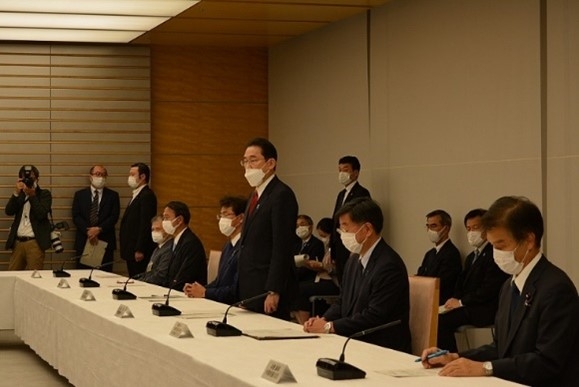
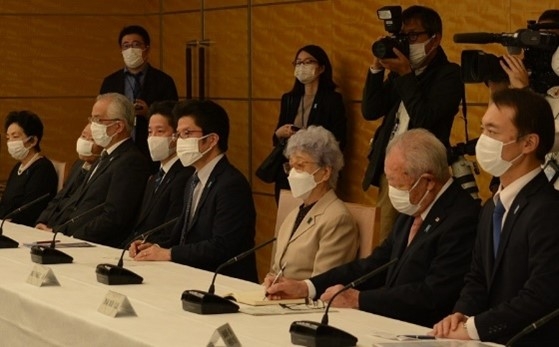
2. Investigations by the GoJ
The GoJ, with the continuous cooperation from the returned abductees, has been thoroughly investigating the cases of abduction by North Korea as well as the cases of disappearances in which the possibility of abduction by North Korean agents cannot be ruled out. As a result of such investigations, the GoJ has so far identified 12 separate incidents involving a total of 17 Japanese citizens abducted by North Korea.
The National Police Agency of Japan determined that a case in which an elder sister and younger brother of Korean nationality were abducted from Japan (two abductees) is also a suspected abduction case committed by North Korea. It has issued domestic arrest warrants for 11 suspects including North Korean agents, who were involved in abduction cases, and then also issued for them international arrest warrants.
Furthermore, regarding the investigations into the disappearances in which the possibility of abduction by North Korean agents cannot be ruled out, Japanese authorities have been striving to reveal the truth behind these cases by reinforcing their efforts, including (1) the installation of a Special Guidance Section in the Foreign Affairs Division of the National Police Agency in March 2013 to conduct supervision and coordination between prefectural police departments, (2) the recovery of physical evidence from family members for DNA testing, and (3) the posting of information on the websites of the National Police Agency and prefectural police departments, including a list of the people who are involved in the cases in which the possibility of abduction by North Korean agents cannot be ruled out in their disappearance. In addition, by enhancing their partnership, the Police and Japan Coast Guard have been collectively reinvestigating cases that were originally handled as marine accidents.
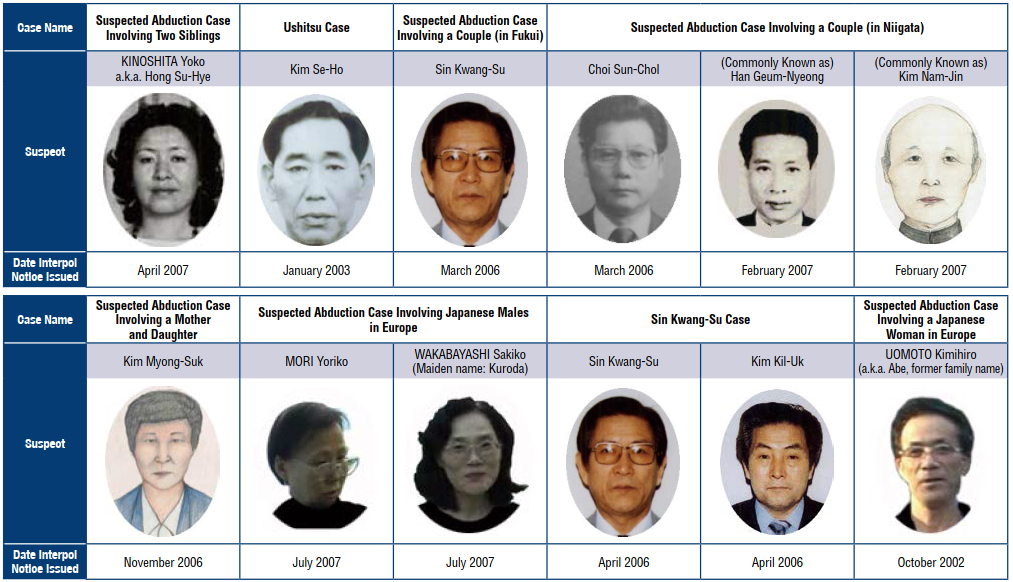
3. Major Activities to Publicize and Promote the Understanding of the Abductions Issue
The Law Concerning Measures to Address the Abductions Issue and Other North Korean Human Rights Violations was promulgated and came into effect in June 2006 with the purpose of increasing awareness among Japanese nationals of the abductions issue and other human rights violations committed by North Korean authorities. In cooperation with the international community, the law also aims to elicit a full account of the situation surrounding the abductions issue and to prevent abductions from happening again in the future. In addition to laying out the responsibilities of the GoJ in resolving the abductions issue, this law holds national and local governments responsible for raising awareness of the issue and to this end establishes North Korean Human Rights Abuses Awareness Week (December 10 - 16), which calls on national and local governments to hold educational events on the topic during this week. The GoJ also distributes pamphlets and posters, screens movies and cartoons which raise awareness about the abductions issue, dispatches personnel for workshops and other educational events, hosts essay contests for junior high and high school students, holds training for teachers, university students aspiring to become teachers and others, broadcasts radio programs (in Japanese and Korean) to North Korea and holds arts performances aimed at raising awareness of the issue, etc. In particular, during North Korean Human Rights Abuses Awareness Week, many conferences and symposia, etc. are held by governments and NGOs to advocate the resolution of the abductions issue both inside and outside of Japan.

MEGUMI (Japanese animation)

Posters distributed nationwide
In October 2020, with the determination not to stall the efforts of the international community to resolve the abductions issue by North Korea, even while COVID-19 is raging globally, the GoJ released the video messages, “Voices of the International Community Calling for the Resolution of the Abduction Issue,” with the support of international partners, families of victims all over the world, and an expert on the issue.
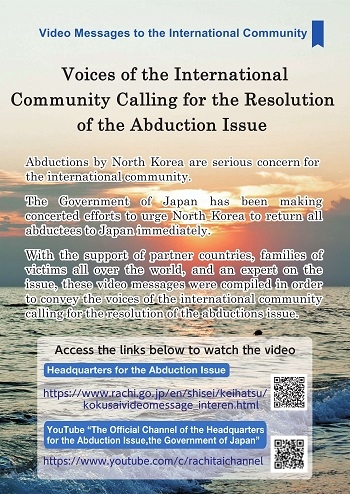
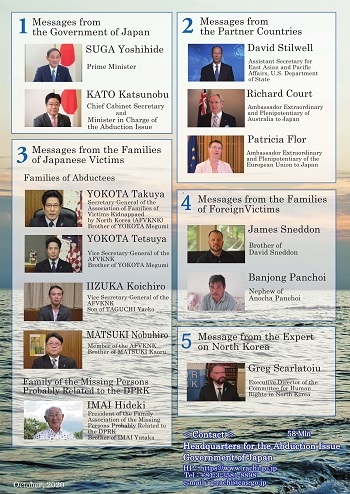
4. Actions against North Korea
On July 5, 2006, North Korea launched seven ballistic missiles. Since then, despite repeated warnings from the international community, Pyongyang again launched ballistic missiles in April 2009, April 2012 and December 2012. It also carried out nuclear tests in October 2006, May 2009 and February 2013. In addition, in March 2010, North Korea launched a torpedo attack on an ROK naval vessel. In response, the GoJ protested firmly, expressing strong condemnation of these North Korean actions, and imposed a series of measures against North Korea. In addition to the sanction measures set out in the UNSC resolutions, Japan requested its own citizens to refrain from traveling to North Korea, banned the entry of North Korean nationals into Japan as well as of North Korean flagged ships and ships that have made port calls in North Korea into Japanese ports and also, prohibited export and import with North Korea.
Based on what was agreed in May 2014, that July Japan lifted restrictions on visits of persons, special measures of restriction on North Korea regarding the amount of money requiring notification of the export of means of payments and report on the money transfer, and the embargo on the entry of North Korea flagged ships with humanitarian purpose into Japanese ports.
However, in response to North Korea’s January 2016 nuclear test and February ballistic missile launch, in February that same year, Japan implemented restrictions on visits of persons; lowered the minimum amount of money requiring notification of the export of means of payment; prohibited in principle the payment of money to North Korea; prohibited the entry of North Korean flagged ships as well as ships carrying the flag of a third country which stopped at a port in North Korea, including those with humanitarian purposes, into Japanese ports; and also expanded the list of related organizations and individuals subject to asset freezing. In addition, Japan also implemented measures against North Korea based on UNSC resolution 2270 adopted in March of that year, including prohibiting the entry into Japanese ports of ships designated as subject to sanction and expanding the list of related organizations and individuals subject to asset freeze.
Furthermore, in September 2016, North Korea conducted the second nuclear test in the year. It also launched over 20 ballistic missiles in that year. Taking into account that it failed to resolve the abductions issue in spite of strong calls to return all abductees as soon as possible, Japan upgraded restrictions on travel to North Korea, prohibited the entry into Japanese ports of Japanese flagged vessels which had stopped at a port in North Korea, and further expanded the list of related organizations and individuals subject to asset freeze in December of that year. Additionally, based on the UNSC resolution 2321 adopted in November that same year, Japan again further expanded the list of related organizations and individuals subject to asset freeze.
Moreover, in 2017, North Korea launched 17 ballistic missiles, including three with an intercontinental ballistic missile (ICBM) range, and in September of the same year, North Korea carried out the sixth nuclear test, the scale of which is estimated to be the largest in its history. Meanwhile, UNSC adopted resolutions 2356, 2371, 2375 and 2397 in June, August, September and December of the same year respectively, and Japan expanded the list of related organizations and individuals subject to asset freeze based on those resolutions. In addition, Japan implemented autonomous measures in July, August, November and December of the same year, designating additional entities and individuals subject to asset freeze.


